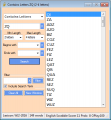| « On Software | IT Educational Disconnect » |
Immersion
<Posted on it-toolbox.com>
Last week my Systems Analysis instructor mentioned the concept of immersion, as it was addressed by Tom DeMarco in the book Slack. In it, DeMarco mentions, "kinds of work that require immersion into the task before progress can begin." I don't have the text so I can't review it, but I am very familiar with the concept in my own work and study habits.
Job: what you get done
On the job, Immersion has a lot to do with what you can get done. In a work environment, I always got a lot more done when I could focus just on one project. Very often I would spend all day on a database, copy it to a flash drive, take it home and work all night on it, and then work on it all day the next day. Every feature I added to it inspired me to continue working. In some cases, as DeMarco alludes, you have to be immersed in something for a period of time before you get anything done.
School: how much you retain
In school, or any kind of self-study, immersion also determines just how much you retain. I still take pride in learning Photoshop in a couple months and passing the Adobe Certified Expert exam. The accomplishment was supposed to reflect years of experience working in that environment. Similarly, I remember some of the summer classes I've taken in the past. They involved a lot of work over a short period of time, but my retention level was much higher. Disclaimer: Immersion is not the same thing as cramming all light for an exam.
School: how much you learn
Another aspect might go without saying, when you are immersed in a subject, you are not likely to forget concepts if there is a short period of time between the times you are studying or working on it. There's not as much refreshing required.
Unfortunately, formal education is not designed that way. In a typical semester students' are divided between four and five different classes, working on each one a few hours a day. As a result, saturation levels are pretty low. Subsequently, students need to be refreshed in subsequent courses in the same area. This is my second class in Systems Analysis, and I have at least one more in the same area. It's more advanced, but a lot of what I've learned this class will have to be refreshed.
Immersion and Fatigue
In both areas there is a saturation level. In some projects I get involved in, there eventually comes a point of fatigue where nothing seems to work. It's as if some things just don't connect. After a little rest, you can come back fresh and pick up where you left off. It is important to learn just how much time you can stay away from a project before you start loosing some of the inertia you've built up. For me, it's usually not much. A four hour nap does wonders. Longer breaks are reserved for breaking points (milestones) in a project.
PM Side note:
In PM, I suspect that success is often dependent on the levels of immersion by team members. Piddle with it a few hours a week and you're not likely to get much done, much less remember what you were doing.

